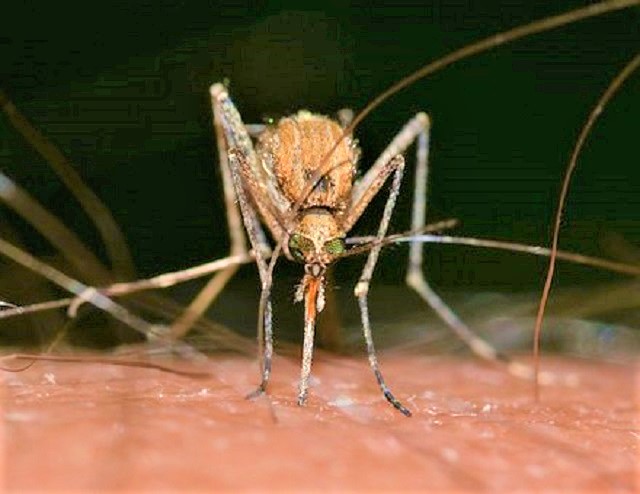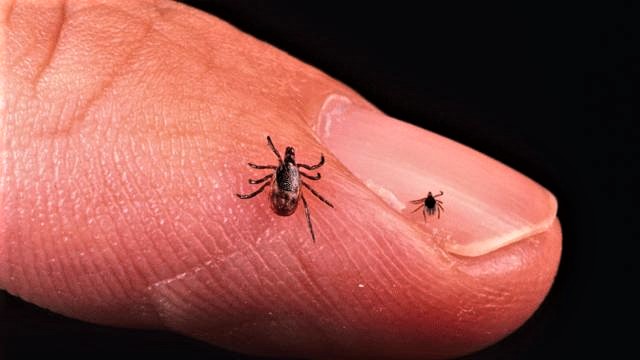Take Care to Prevent Bites from Mosquitoes and Ticks

Mosquitoes and West Nile Virus

Adult and nymph deer ticks
IDPH recently reported that a mosquito pool in Winnebago County tested positive for West Nile virus (WNV), marking the first positive batch of mosquitoes this year in Illinois. Last year, in Illinois there were 69 human cases of WNV with 13 deaths, and 54 positive birds. The Will County Health Department maintains 14 traps throughout the county to test batches of mosquitoes for WNV. At present, there have been no positive batches.
“West Nile Virus can lead to serious illness, especially for our Illinois seniors and people with weakened immune systems,” said IDPH Director Dr. Sameer Vohra in a press release.
“With the virus appearing earlier this year following a milder winter and spring, I urge everyone to fight the bite in their communities. Please reduce exposures, wear insect repellent while outdoors, and report any standing water around your community where mosquitoes can breed.”
WNV typically causes mild, flu-like symptoms. According to the CDC, most people [8 out of 10] infected with West Nile virus do not develop any symptoms. About 1 in 5 people who are infected develop a fever with other symptoms such as headache, body aches, joint pains, vomiting, diarrhea, or rash. Most people who develop symptoms from WNV recover completely, but fatigue and weakness can last for weeks or months.
However, according to the CDC, about 1 in 150 people who are infected develop a severe illness that affects the central nervous system such as inflammation of the brain (encephalitis) or inflammation of the membranes that surround the brain and spinal cord [meningitis). Severe illness can occur in people of any age, however people over 60 years of age are at greater risk for severe illness if they are infected. People with certain medical conditions, such as cancer, diabetes, hypertension, kidney disease, and people who have received organ transplants, are also at greater risk.
Because there is no vaccine available to prevent West Nile virus, it is important to avoid mosquito bites. IDPH encourages the public to Fight the Bite by practicing the three “R’s” – reduce, repel, and report:
• REDUCE – make sure doors and windows have tight-fitting screens. Repair or replace screens that have tears or other openings. Try to keep doors and windows shut. Eliminate, or refresh each week, all sources of standing water where mosquitoes can breed, including water in bird baths, ponds, flowerpots, wading pools, old tires, and any other containers.
• REPEL – when outdoors, wear shoes and socks, long pants and a light-colored, long-sleeved shirt, and apply an EPA-registered insect repellent that contains DEET, picaridin, oil of lemon eucalyptus, or IR 3535 according to label instructions. Consult a physician before using repellents on infants.
• REPORT – report locations where you see water sitting stagnant for more than a week such as roadside ditches, flooded yards, and similar locations that may produce mosquitoes. The Will County Health Department or city government may be able to add larvicide to the water, which will kill any mosquito larvae.
West Nile virus and birds
WNV is transmitted to birds through the bite of an infected mosquito. Mosquitos can also become infected by biting infected birds. According to the Centers for Disease Control and Prevention (CDC), since WNV was discovered in United States in 1999, the virus has been detected in over 300 species of dead birds. Crows, jays and robins are the most common birds to carry WNV.
There is no evidence that a person can get WNV from handling live or dead infected birds. However, avoiding bare-handed contact with any dead animal is always recommended. If you must pick up a dead bird, use gloves, a shovel or an inverted plastic bag to place the bird in a garbage bag.
What to do if you find a dead bird on your property?
Due to the avian influenza, Illinois Department of Public Health will not be accepting birds to test for West Nile virus this year. The Will County Health Department and IDPH recommend using caution when disposing of any dead birds found on your property. When disposing of the dead bird use disposable plastic gloves or another barrier such as an inverted plastic bag to prevent touching the bird with your bare hands. Place the dead bird in a doubled plastic bag and dispose of the bag in the trash where it cannot be accessed by children or animals. Note: If you expel the air from the bag ensure you expel the air away from your face.
For more information on WNV and what can be done to prevent getting bitten by mosquitoes, visit the Centers for Disease Control and Prevention’s West Nile virus page at https://www.cdc.gov/westnile/ or at the Illinois Department of Public Health’s West Nile Virus page at https://dph.illinois.gov/topics-services/diseases-and-conditions/west-nile-virus.html .
Tickborne Illness
Blacklegged ticks are known to carry Lyme disease, an illness that causes a rash, fever, chills, headaches, muscle and joint aches. More severe symptoms can include facial palsy (loss of muscle tone or droop on or both sides of the face), arthritis with sever joint pain and swelling, intermittent pain in the nerves, tendons, muscles and joints, shortness of breath and heart palpitations or an irregular heartbeat.
“Lyme disease is a serious bacterial infection transmitted through the bite of infected ticks,” said Vohra. “Lyme Disease is the most common vector-borne illness in the United States affecting more than 500,000 people nationally each year. As the summer approaches, I encourage our residents to learn to ‘Fight the Bite’ and protect yourself and your loved ones from tickborne illnesses. If you have been in wooded or high grassy areas and are experiencing symptoms – fever, fatigue, headache and a circular rash – see your health care provider immediately.”
In addition to Lyme disease, other serious tickborne diseases include Rocky Mountain Spotted Fever, Tularemia, Ehrlichiosis, and Babesiosis. Some tickborne illnesses can be life threatening. Rocky Mountain Spotted Fever is particularly dangerous and may cause death as quickly as five days after symptom onset.
If you become ill with fever and/or rash after being in an area prone to ticks, contact your healthcare provider immediately.
The following are additional tips for how to avoid tickborne illnesses and have a healthy time in the outdoors:
To remove a tick: If you find a tick attached to your skin, grasp it with tweezers as close to the skin as you can. Pull up on the tick with steady pressure. Do not squeeze the tick. Wash the bite area and your hands with soap and water. Dispose of the tick by sticking it to a piece of tape and placing it in the trash or by flushing the tick in the toilet.
Walk in the center of trails. Avoid wooded, bushy areas with high grass and leaf litter.
Wear light-colored clothing to make ticks easier to find. Tuck long pants into socks and boots.
Apply an EPA-registered insect repellent containing 20% DEET, picaridin, IR3535, or Oil of Lemon Eucalyptus according to label directions.
Conduct full-body tick checks on family members (underarms, ears, belly button, behind knees, between legs, waist, hair and scalp) every two to three hours. Also check any gear or pets taken on outings.
To kill ticks after being outdoors, put clothes in the dryer on high for 10 minutes (or one hour for damp clothes).
Bathe or shower within two hours after coming indoors.
If you find a blacklegged tick on you that may have been attached for more than three days, then seek medical attention to decide if you need an antibiotic to prevent Lyme disease.